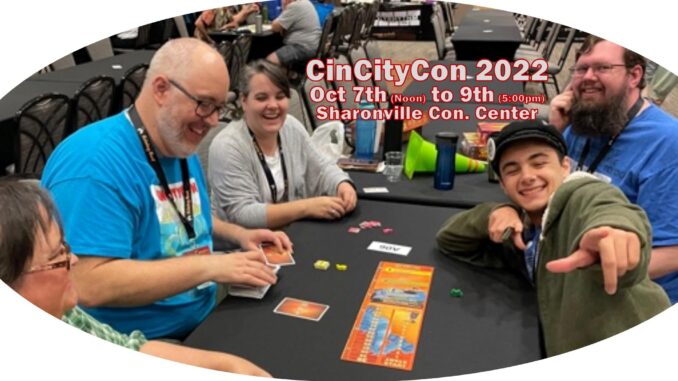
As a regular attendee of multiple tabletop gaming conventions, I’m writing a plea: Convention organizers, mark your calendars with the dates of every competing geek convention – large, regional, or local – and don’t host your convention on the same weekend! Talk to the other convention organizers and stop going head-to-head with them. This I beg you as a fan and publisher.
What am I complaining about? Two or more geek (tabletop gaming, comics, sci-fi, fantasy) conventions happening in the same state, or adjacent states, at the same time. Overlapping conventions hurt everyone.
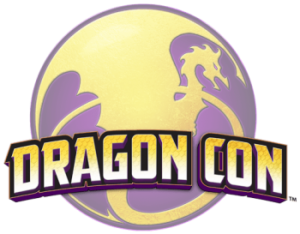 To prove my point, I’m going to share a few real-world examples. These examples are not condemnations of the conventions or their operators. I have nothing but respect for them and the efforts that they undertake to make conventioning fun. Each of them should read these updates in the spirit of constructive criticism, not dislike of them, their work, or their property. Furthermore, every convention on this list is something I’ve either attended or desperately want to attend. I’m a fan and I’m not trying to impact their business, just point out the crowding of the calendar and the difficulties fans experience with competing geek conventions.
To prove my point, I’m going to share a few real-world examples. These examples are not condemnations of the conventions or their operators. I have nothing but respect for them and the efforts that they undertake to make conventioning fun. Each of them should read these updates in the spirit of constructive criticism, not dislike of them, their work, or their property. Furthermore, every convention on this list is something I’ve either attended or desperately want to attend. I’m a fan and I’m not trying to impact their business, just point out the crowding of the calendar and the difficulties fans experience with competing geek conventions.
That said, consider this first example where going head to head has an impact: The weekend of March 9th and 10th, 2019 in Alabama, Georgia, and South Carolina.
- Huntsville Comic & Pop Culture Expo March 9th and 10th, 2019 in Huntsville, Alabama
- Atlanta Science Fiction and Fantasy Expo March 9th and 10th in Decatur, Georgia (a suburb of Atlanta)
- Toylanta March 8th to the 10th, 2019 in Atlanta, Georgia
- SC Comicon March 9th and 10th, 2019 in Greenville, South Carolina
 Huntsville to Atlanta is 3 hours and 15 minutes by car. Atlanta to Greenville is 2 hours and 15 minutes by car. Do those sound close together? Because they are. In a single weekend, there were two comic shows, a toy show, and a geek culture convention going head-to-head in a geographically small area (for North America). To add insult to injury, that weekend the Captain Marvel film from Disney was in its second weekend of release. Each of those four shows was still a great experience (I was able to make it to three of the four so I’m speaking firsthand on these). However, they cannibalized fans and retailers from the same audience as fans had to choose what show(s) they were going to attend.
Huntsville to Atlanta is 3 hours and 15 minutes by car. Atlanta to Greenville is 2 hours and 15 minutes by car. Do those sound close together? Because they are. In a single weekend, there were two comic shows, a toy show, and a geek culture convention going head-to-head in a geographically small area (for North America). To add insult to injury, that weekend the Captain Marvel film from Disney was in its second weekend of release. Each of those four shows was still a great experience (I was able to make it to three of the four so I’m speaking firsthand on these). However, they cannibalized fans and retailers from the same audience as fans had to choose what show(s) they were going to attend.
Another scenario, two conventions happen in the same state in the first half of the month. Most fans get paid every two weeks which means one check in the first part of the month and one in the second. If two geek conventions happen in the first half of a month, they have to be paid for using the same paycheck and there’s only so much cash to go around.
 I attended Conapalooza on October 11 to 13, 2019 in Kingsport, Tennessee, a fun event that I wrote about here. It’s 1.5 hours from Kingsport to Knoxville, Tennessee, a larger city. Fanboy Expo Knoxville Comic Con happened October 18th to the 19th, 2019, the weekend after Conapalooza. Unfortunately, Fanboy Expo, a larger show, drew fans away from Conapalooza as everyone had to decide how to spend their limited resources.
I attended Conapalooza on October 11 to 13, 2019 in Kingsport, Tennessee, a fun event that I wrote about here. It’s 1.5 hours from Kingsport to Knoxville, Tennessee, a larger city. Fanboy Expo Knoxville Comic Con happened October 18th to the 19th, 2019, the weekend after Conapalooza. Unfortunately, Fanboy Expo, a larger show, drew fans away from Conapalooza as everyone had to decide how to spend their limited resources.
Going head-to-head means that fans, publishers, and exhibitors have to choose which convention they can give time and money to attend. For the later two groups, there are likely to be fewer fans which impacts every vendors financials. Heck, it impacts the conventions numbers as well. Being geographically proximate and close time wise means that everyone has to make a choice as to what they’ll do.
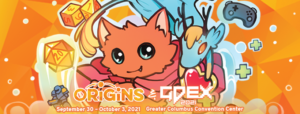 Let’s look at a few more examples. In 2021, Origins Game Fair in Columbus, Ohio (which I wrote about here and here) moved their weekend to the same one as CinCityCon in Cincinnati, Ohio. This move was due to Covid and the extraordinary circumstances that came with the pandemic, but the move still hurt both shows. Changing dates put two tabletop gaming conventions under two hours drive away from each other. While one is much larger than the other (2019 attendance numbers were 18,648 for Origins and 901 for CinCityCon), their proximity undercut their fans’ ability to attend.
Let’s look at a few more examples. In 2021, Origins Game Fair in Columbus, Ohio (which I wrote about here and here) moved their weekend to the same one as CinCityCon in Cincinnati, Ohio. This move was due to Covid and the extraordinary circumstances that came with the pandemic, but the move still hurt both shows. Changing dates put two tabletop gaming conventions under two hours drive away from each other. While one is much larger than the other (2019 attendance numbers were 18,648 for Origins and 901 for CinCityCon), their proximity undercut their fans’ ability to attend.
Unless something changes in 2022, Ohio is going to have another overlapping weekend but with a different combination of shows. Con on the Cob in Richfield, Ohio and CinCityCon in Cincinnati are planned for the same weekend. They’re in the same state, but three-and-a-half hours apart. While an overwhelming amount of any convention’s attendance is local, there are bound to be nice percentage points that will make the trip to both…unless they happen at the same time. These decisions reduce the pool of attendees.
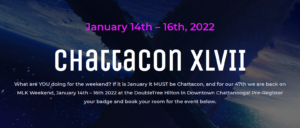 Let’s consider a different type of challenge: same city, same quarter. Every year, Chattanooga, Tennessee hosts two notable local conventions: Chattacon (January) and Con Nooga (February). For those of you that have never heard of Chattanooga beyond the song, it’s the 4th largest city in Tennessee and about two hours from Atlanta and Nashville. It’s metropolitan area (city and suburbs) is about a million citizens. For comparison:
Let’s consider a different type of challenge: same city, same quarter. Every year, Chattanooga, Tennessee hosts two notable local conventions: Chattacon (January) and Con Nooga (February). For those of you that have never heard of Chattanooga beyond the song, it’s the 4th largest city in Tennessee and about two hours from Atlanta and Nashville. It’s metropolitan area (city and suburbs) is about a million citizens. For comparison:
- Philadelphia, Pennsylvania (Pax Unplugged with 30k attendance pre-Covid) is located in a metropolitan area with 7.2 million citizens
- Atlanta, Georgia (Dragon Con with 85k pre-Covid) is 6.8 million
- Columbus, Ohio (Origins Game Fair with 19k pre-Covid) is 2.5 million
- Indianapolis, Indiana (Gen Con with 70k pre-Covid) is 2.45 million
Chattanooga is a smaller city compared to any on that list. As one of the smaller cities, it still hosts two geek conventions almost back-to-back. First, I want to applaud both Chattacon and Con Nooga for existing and expanding geek culture. In both cases the conventions are tight ships and well-organized, and more importantly, they’re fun for those that attend as they are the size they set out to be. Their proximity on the calendar impacts their fans that lack deep pockets. Many have to choose between them because doing both may not be an option financially or work schedule wise.

Is my opening plea crystallizing into an image of a packed calendar and map? With 12 months and 52 weekends per year to choose from, each town and region would be better off without a glut of conventions happening on top of each other. You, as a fan, have to choose what you can afford to support, and more time between shows helps fans recuperate your funds so you can attend more conventions.
But it’s not all overlapping calendars. Let’s talk about the Atlanta geek convention calendar for a moment. Atlanta hosts four large (tens of thousands of attendees) geek conventions per year: Dragon Con (Labor Day weekend, which I talked about here), MomoCon (May), Anime Weekend Atlanta (October), Atlanta Comic Con (August), and one medium one (around 5k attendees), Southern-Fried Gaming Expo (July). Then there are several smaller shows ranging from one-day events to full weekend shows like Walker Stalker Con (October), Multiverse (October), NerdiGras (March), and JordanCon (April).
Just looking at Atlanta’s big and medium shows (because the others are going to have to squeeze in where they can), they run May to July to August to early September to late October. In Atlanta, there are five notable geek conventions with around a month to six weeks between each gathering. While that does put pressure on wallets as well as time off calendars, it is spaced out enough that a fan might be able to afford two or more shows a year.
 Conventions are a great time and every one mentioned here is worth attending. Full stop. If you love geek culture, these shows are a blast. This article is not meant to suggest otherwise. Instead, this piece is meant to raise awareness about one aspect of these shows. But, if you can attend a geek convention, I encourage it.
Conventions are a great time and every one mentioned here is worth attending. Full stop. If you love geek culture, these shows are a blast. This article is not meant to suggest otherwise. Instead, this piece is meant to raise awareness about one aspect of these shows. But, if you can attend a geek convention, I encourage it.
While this article just looks at the results and not the causes of these bottlenecks, it is only meant to illustrate the issue as fans and vendors see the world. For the convention organizers, there is another layer of organization and finances that they have to consider, but that’s material for another piece.
To bring this back to my initial plea, consider this: In an ideal world, it is my hope that each geek convention organizer will consider their competition more broadly and push to include everyone possible in their designs. When creating a new convention, please don’t go head-to-head on the calendar with another local or near-regional show. If someone moves to your convention’s date, that’s unfair. Still, consider the benefits of moving your calendar, if possible. This applies for every attendee, vendor, and convention: Trying to divide a small pie will leave everyone hungry.
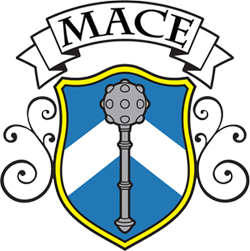 Speaking of conventions, Egg Embry Publishing will be at MACE this weekend. If you’re attending, stop by and say hi.
Speaking of conventions, Egg Embry Publishing will be at MACE this weekend. If you’re attending, stop by and say hi.
MACE Tabletop Gaming Convention
November 12 to 14, 2021 at the Hilton Charlotte University Place in Charlotte, North Carolina. MACE (Mid Atlantic Convention Expo) is a table top gaming convention with a good mix of RPGs. This show will be their 25th anniversary, a great accomplishment for a local gaming convention.
Disclosure: While Egg Embry pays for his travel, hotel, and food, certain conventions discussed in this article provide complimentary entry to their cons because he registers as a member of the press/media.
Latest posts by Egg Embry (see all)
- New Gamemaster Month 2023 - January 20, 2023
